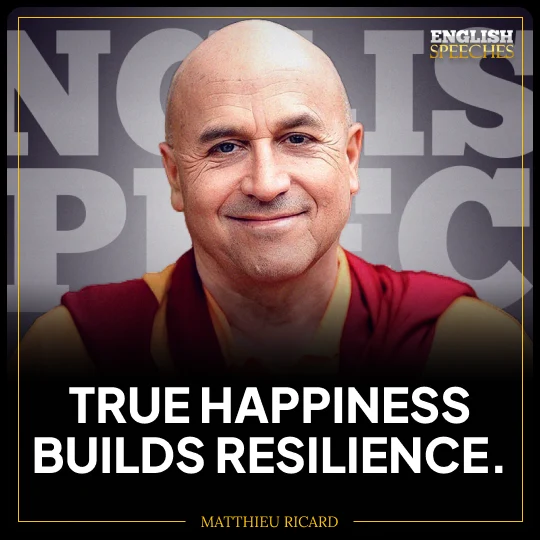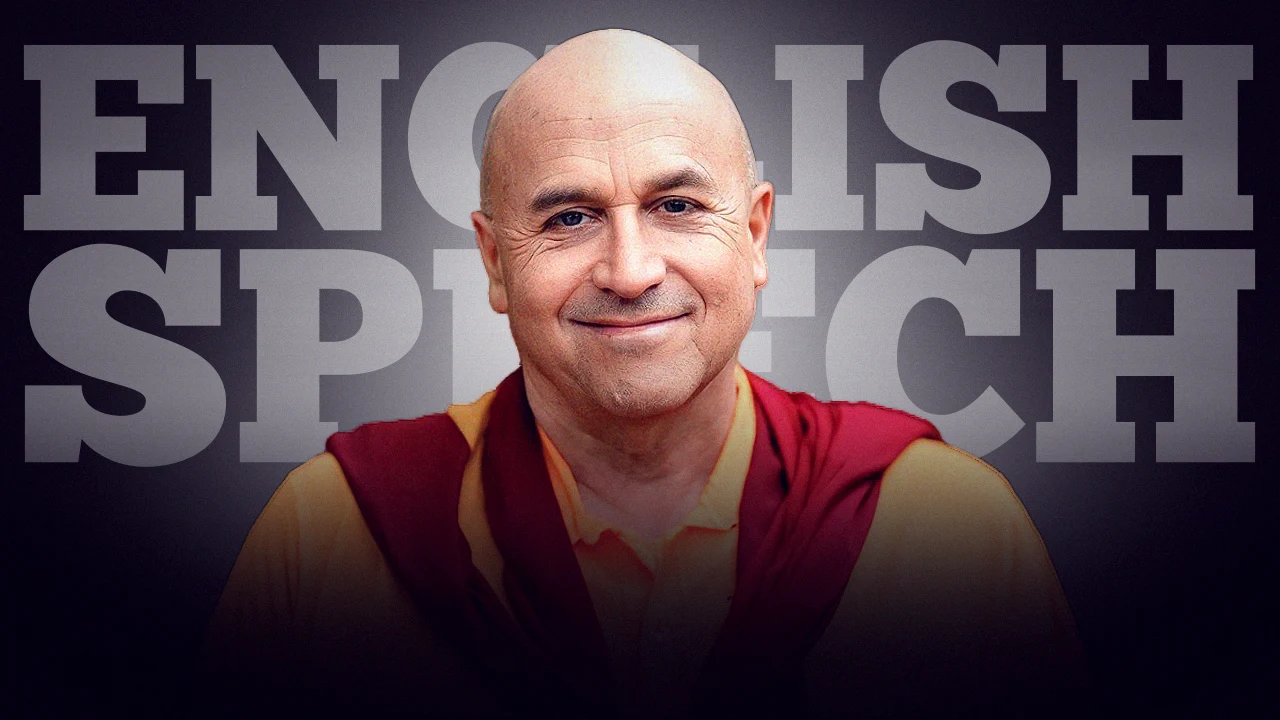Matthieu Ricard, in his speech at Google Zeitgeist 2013, explored the nature of happiness and well-being from a Buddhist perspective. He presented the idea that true happiness goes beyond fleeting pleasures and is rooted in cultivating inner peace, compassion, and resilience. Ricard challenged the audience to rethink conventional views on pleasure and satisfaction, suggesting that genuine happiness is a state of being that grows stronger with practice and mindfulness, rather than through external achievements or material gains.
A Path to Genuine Happiness
Throughout his speech, Ricard drew a clear distinction between temporary pleasure and lasting happiness, emphasizing that our well-being should not depend solely on outer circumstances. He illustrated this through personal experiences and simple yet powerful examples, such as the satisfaction gained from moments of inner tranquility rather than external success. His message highlighted three fundamental aspects of genuine happiness:
- Inner Peace: Ricard stressed the importance of cultivating inner peace as a foundation for happiness. He explained that this involves developing a calm and stable mind that is not easily disturbed by life’s challenges.
- Compassion: For Ricard, compassion is at the heart of happiness. He argued that selflessly caring for others and developing a deep sense of connectedness with all beings fosters a sense of fulfillment that transcends personal pleasure.
- Resilience: The ability to navigate life’s ups and downs with strength and determination was another key theme. Ricard emphasized that true happiness equips individuals to face difficulties without losing their sense of purpose or well-being.
These concepts, Ricard explained, are not only important for personal growth but also for building a more compassionate and harmonious world.
Key Lessons and Themes
Ricard’s talk conveyed several key lessons that resonate across different cultures and societies:
- Happiness is a Skill: Rather than something that is found or given, happiness can be cultivated through consistent practice. Ricard compared this to learning any other skill, such as playing a musical instrument or mastering a sport.
- The Power of Compassion: By shifting focus from individual desires to the well-being of others, people can find a deeper and more sustainable form of happiness. Ricard shared how practices like meditation and mindfulness can help individuals grow their capacity for compassion.
- Mind Over Circumstances: Ricard reminded the audience that external achievements or possessions are not the ultimate source of happiness. It is the inner condition of the mind that translates experiences into joy or suffering.
- Neuroplasticity and Change: He also touched on how recent discoveries in neuroscience, particularly neuroplasticity, show that the brain can change and adapt, making it possible for individuals to reshape their emotional responses and cultivate greater well-being.
In conclusion, Matthieu Ricard offered a vision of happiness that is grounded in inner transformation and compassion. His words challenge us to look beyond temporary pleasures and external achievements, and to invest in practices that foster lasting peace and fulfillment. The speech serves as a reminder that the pursuit of happiness is not a destination, but a journey of continuous self-improvement and connection with others.
Donwload available for Premium Subscribers
PDF Full Transcript
Explore every word with our concise PDF transcripts.
Audio Version
Immerse in speeches with clear, downloadable audios.
English Lesson
Enhance English skills with interactive speech lessons.
⚬ Free 30-day trial

”True happiness builds resilience.
Transcript
Host: What can we learn from Buddhism and your own experience about happiness? How do we become…
Matthieu Ricard: Well, I was thinking about, you know, since the panel was titled “What about pleasure?” about the relation between the two. You know, people speak of magic moments, like walking in the snow under the stars with a wonderful person. And then, so, but sometimes they say it’s a magic moment, there’s nothing I can do about it. But if you think about why was it magic? At that time, there was a sense of having no inner conflicts, of feeling sort of a bit spacious with the universe, with a loved one, and so this kind of peace. So it’s not that magic, you can understand why it happened. So could we consider that as something like a way of being that we could cultivate as a skill? Now, to come back to pleasure, you come back from this walk in the snow under the stars and you take a wonderful hot shower. It’s bliss, pleasure. Now you stay 24 hours in that hot shower. It’s not so interesting. So pleasure is very much dependent upon time, circumstances. It’s something that uses itself as we consume it. And if it’s on top of that, you add craving or grasping, then somehow it dims the feeling of deep satisfaction. Actually, you can enjoy something pleasurably, and in the brain you build up the wanting circuit which is different, and at the end you may experience something that you want without feeling pleasure—that’s called addiction.
Host: So just to understand, so you’re trying to separate happiness from pleasure, and you say pleasure is much more temporary?
Matthieu Ricard: Well, pleasure is… you look for pleasurable sensations, and so those are very vulnerable, let’s say, to outer circumstances. And basically if you are keeping on trying to renew that all the time, and this is the recipe for happiness, it looks more like a recipe for exhaustion than happiness. So let’s take happiness now as a way of being. So a way of being which is not just happiness on its own but is a cluster of human qualities. That is inner peace, inner strength, inner freedom. It is loving kindness, compassion, friendship, resilience, inner courage. And those are things that the more you experience them, rather than pleasure, the more actually they get deeper and stronger because it builds up something. So in the end you end up with inner resources to deal with the ups and downs of life no matter what happens, and the opposite of pleasure. So it builds a platform in life on which you come back, after winning the lottery you come back or even go below. It’s a drama, you also come back to that platform, but you raise that platform as a skill. So now it’s also something that gives you a sense of confidence that you can go through the ups and downs of life. So therefore you feel less vulnerable, you feel less threatened, you feel less protective, so you also naturally will open more to others. So that element, I think especially the notion of loving kindness, altruism, compassion, benevolence, those are key components to genuine happiness. And it’s not necessarily pleasant. We were talking yesterday while taking a walk that can it be compatible with sadness. So if it’s pleasure, no way. But you see an injustice, a massacre, it’s incredibly sad. But you can keep the sense of courage, of determination to change that, of compassion, of sense of direction in life, and so you will treat that in the best possible way, in a constructive way, you won’t fall into despair. So it’s compatible with what I call a way of being, which is flourishing and well-being, even though it’s very unpleasant. So in that sense it is different.
Host: So I want to find out how you do this, because it sounds interesting, I mean it sounds promising, but… So here’s my kind of big struggle with pleasure. There’s an analysis of people who’ve been climbing mountains. And when you read these stories about mountain climbing, they look, they seem like stories of pure misery. You would think it’s elation, no, first of all it’s really dangerous, but it’s frostbite and hard to breathe and hard to walk and injuries and so on. And from these descriptions you say, “Somebody just did that.” And they go to the top, they will say, “This was the biggest mistake of their lives.” They’ll go down and never do it again. And from then maybe just try to get simple pleasures out of life rather than this horrific experience. Nevertheless, people finish climbing big mountains in the Himalayas, and they go back and do the same thing again. And it’s the kind of pleasure that looks to me like it’s not captured day-to-day thinking. It’s a pleasure that comes from achievement, and it’s a pleasure that comes from competition, it’s a pleasure that comes from overcoming challenges, it’s a pleasure that comes from pain and misery and some interesting…
Matthieu Ricard: You know the idea of flow. It is not so much the competition. Flow is something that you are fully engaged in. You forget yourself. It’s just challenging enough that you have to put the best of yourself, not too much that you panic, so it’s not boring and not stressing. So flow can be achieved through mountain climbing or a surgeon or an artist. It could be achieved also through meditation. It’s flow without action. So a continuous stream of experience which has a quality, a sense of flourishing, that you don’t… the time takes another value. When I sit in my hermitage, some people say, “It must be so boring, sit a month alone in the hermitage. Don’t you feel lonely? Don’t the time seem long?”
Host: You must have access to all Paul’s movies when you sit there.
Matthieu Ricard: But I find the time so rewarding. Before lunch break, 15 minutes is like a stream of melted gold. I have these 15 minutes to just go deeper and try to generate compassion and all that. So it is a kind of inner flow. So I think really it’s the quality of the experience that will determine over the long time how you go about that.
Host: So you’ve been called the happiest man in the world, I think.
Matthieu Ricard: Sorry, I made so many disclaimers about that.
Host: I didn’t say you said it.
Matthieu Ricard: Forget about that.
Host: Somebody said it. Clearly you’re very happy.
Matthieu Ricard: Not too bad.
Host: So we’ve tried to kind of think about what kind of things we do wrong and how can we do it better. Spending money, being happy, what kind of things our intuitions are generally not correct. From your experience, what kind of things actually are making people become happier and more satisfied?
Matthieu Ricard: Typically, you know, the lottery studies very much. The comments, people say, “Oh, of course if I had that, I would be happy.” And then you hear of people who have everything to be happy. They are beautiful, they are famous, they have a lot of money, and you learn they are very depressed. “Oh, if I had that, what’s wrong with this guy? If I had that, I would be happy.” I think it’s too much. Of course, we need to improve the outer conditions. No question. Especially, there’s still 1.5 billion people living in abject poverty. There’s conflict. There are mothers who can’t feed their children. No question that we should improve outer conditions in this world. This being said, especially when we have what we need, if we keep on placing all our hopes and fear in the outer world, we are in for a big disappointment. Because precisely when we get it, we say, “So what?” We expect from that something wonderful, and it’s just ordinary. So we vastly underestimate the importance of inner conditions. We deal with our mind from morning till evening. That’s the ultimate experience of whatever you do, whether you get a Ferrari or something else, it’s your mind that’s going to translate that in happiness or misery. And that mind can be our best friend or your worst enemy. Depends how it works. So at least if we could pay some attention on how to deal with the mind, how to deal with emotions, how to recognize that aggressivity, hatred, jealousy, arrogance, craving, will just destroy your happiness and basically make you act in ways that destroy the happiness of others. And if you find out that loving kindness, compassion, cultivating inner peace, the simplicity of the present moment contribute to flourishing, you will be a person that will be happier to be with, and that transformation will lead you to serve better others, then you realize that cultivating our skills, those inner conditions matter tremendously.
Host: I buy it. But how do you do it? So what do you… Okay, so I want to be less jealous.
Matthieu Ricard: How do you learn chess? How do you learn to read and write? How do you learn to juggle or play the tennis? You practice. We do have this unconditional love feeling for a very dear person for 15 seconds or so, and it comes back and goes. But who sits for 30 minutes cultivating loving kindness? Very few. My friend Paul Ekman said we should have compassion gymnasium every block. We should…
Host: Give us a specific example. So how do you practice compassion?
Matthieu Ricard: So let’s say if you want to practice loving kindness, you should start with something easy, someone you really love, so you don’t have to try to absolutely have loving kindness for a dictator or something, or someone even worse that is your next colleague at the office. So you start with that, and you have this natural love and feeling of embracing, and just you want anything but that person. You want only that person to be happy, be safe, be flourishing in life. And then instead of giving a few thoughts, you let that fill your mental landscape. If it declines, you revive it. And you don’t do that just for a few thoughts. You try to extend that for 10 or 15 minutes, or you repeat it several times in the day for a few minutes.
Host: So you think about that person, and you think about all the wonderful things you want.
Matthieu Ricard: Not only that, but you try to grow a genuine loving sense of love, not just thinking again, but just it’s a trigger. And then after that, you think, well, I don’t wake up in the morning thinking I may suffer the whole day and if possible my whole life. So does that person, so does that person, so does that person. So I project myself in your mind, in their mind, and I say they may be deluded in the way they try to find happiness in the wrong place, but basically they don’t want to suffer. So if I value my own happiness and that of my child, I start valuing them, I see the interdependence among all sentient beings, and suddenly I can extend that. So then comes something that is very rewarding, is that sense of connectedness, of having this natural benevolence to others, that readiness to be at service when occasion comes, and it certainly makes a much more fulfilled life. Experientially, among all positive emotions, loving kindness and compassion, neuroscience will tell you, this is the strongest activation of positive emotions.
Host: So, as a last question, so… you’ve, Buddhism for a long time, you’ve practiced kind and loving meditation, and have argued it’s correct, now the neuroscience is showing changes in the brain as according to it of both experts and novices, why do you think this is not part of the human intuition, of the modern world, that this is something we should be doing? Because, how many people here meditate? That’s probably a big percentage, compared to a regular audience, why do you think this is not something that people intuit?
Matthieu Ricard: First of all, we need to demystify, meditation in Sanskrit means, bhavana means to cultivate, or to become familiar with, so we become familiar with many things, but possibly not exactly the right things for genuine flourishing, so in the Eastern tradition, this is part of life, so not as odd as here, so I think it’s probably that we vastly underestimate potential of mind to change, as skills, oh this is for granted, I’m like that, take it or leave it, but I can’t do much about it, so that’s a loser sort of perspective, but what neuroscience shows, and that’s why that collaboration is so fruitful, is that neuroplasticity can happen at all ages, and it starts within two weeks, and it certainly makes a difference, and in the behavior, I mean we don’t have time, but just now we had, with Richard Davidson, there’s a program for preschoolers, four, five-year-olds, eight weeks, very simple training of pro-social behavior, gratitude and so forth, and you will be amazed of the result, it completely breaks after eight weeks, the in group, out group, they give as much, we ask them to give stickers, to their best friend, and to the less likely friend in the class, after 10 weeks, although in the beginning, they give everything to their best friend, so simple interventions, secular, that based on this experience, from the contemplative side, that can be an immense contribution.
Host: This has been fantastic and inspiring, and I’m looking forward to more, thank you very much. Thank you so much.






